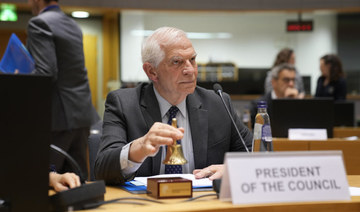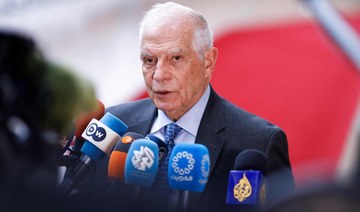AMMAN: Palestinians in Jerusalem are heeding calls by senior Islamic leaders not to cooperate with the Israeli security measures enforced against those entering Al-Aqsa Mosque.
The row has meant that Islam’s third-holiest mosque has been empty of worshippers for five consecutive days.
Despite the fact that the custodianship of the mosque is in the hands of the Jordanian government, Israeli leaders have insisted on the right to install metal detectors.
Ekrima Sabri, former mufti of Jerusalem and the head of the Supreme Islamic Council, told Arab News that what is taking place in Jerusalem is a form of nonviolent civil disobedience.
“We insist that the Israelis remove the metal detectors and at the same time we insist on our right to pray in our Al-Aqsa Mosque,” he said.
A joint statement was issued Monday, signed by Sabri, along with Abdel Azim Salhab — head of the Jordan-backed Waqf council that administers the site — the Grand Mufti of Jerusalem Muhammad Ahmad Hussein, and chief Shariah judge Wasef Al-Bakri.
It calls on worshippers not to use the electronic gates. “If the gates continue to restrict entrance to Al-Aqsa Mosque, we call on our people to pray and worship in the streets of Jerusalem as close to the mosque as possible,” the joint statement read.
Sabri told Arab News that the conflict in Al-Aqsa had become a diplomatic row between the Israeli occupiers and the Jordanian custodians of the holy sites in Jerusalem. “We feel like orphans now, depending on our own people after many have abandoned us,” he said.
Sabri called on Jordan to insist on the status quo, saying he believed that the situation could escalate if the current problem is not solved by prayers on Friday.
Jordan’s king is currently on vacation in the US, Israel’s prime minister is in Europe and the Palestinian President Mahmoud Abbas is on a four-day visit to China.
Palestinian Prime Minister Rami Hamdallah held an emergency Cabinet meeting in Ramallah Tuesday and pledged support for Jerusalemites. He also telephoned the secretary-general of the Arab League and of the Organization of Islamic Cooperation to discuss the situation in Jerusalem.
Jordan’s Foreign Minister Ayman Safadi also spoke with the Russian Foreign Minister Sergey Lavrov. Safadi said on his Twitter account that the two spoke about the need to stop the escalation at Al-Aqsa Mosque and to honor the understanding with Amman.
In 2014 Jordan, the US and Israel agreed on a number of steps to reduce tensions at the Al-Aqsa Mosque, including sticking to the status quo and restricting visits by non-Muslims.
The installation of metal detectors has produced various other reactions.
Khalil Assali wrote on the popular Jerusalem website akhbarelbalad.net that once again Palestinians in Jerusalem are having to defend the mosque all by themselves. He recalled that in June 1967 an Israeli general asked the then mufti why Muslims were not praying in the mosque.
The mufti reportedly replied: “Get your army out of the mosque and then we will pray.”
Assali added that the bravery and the resilience of the people of Jerusalem might be what will help protect and safeguard the site.

























